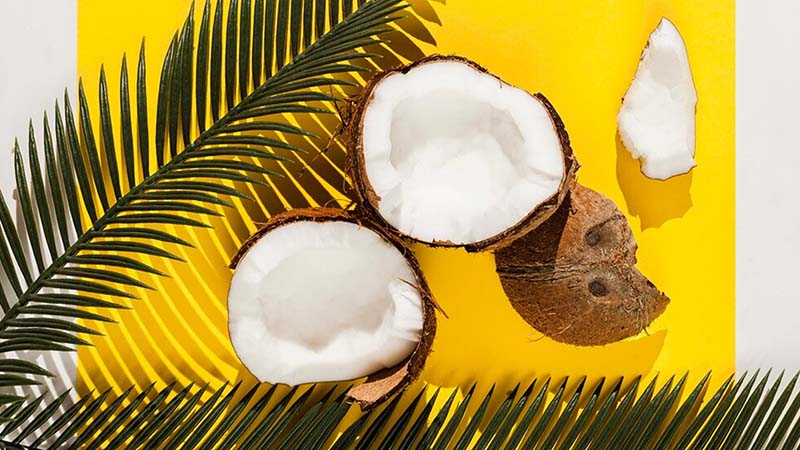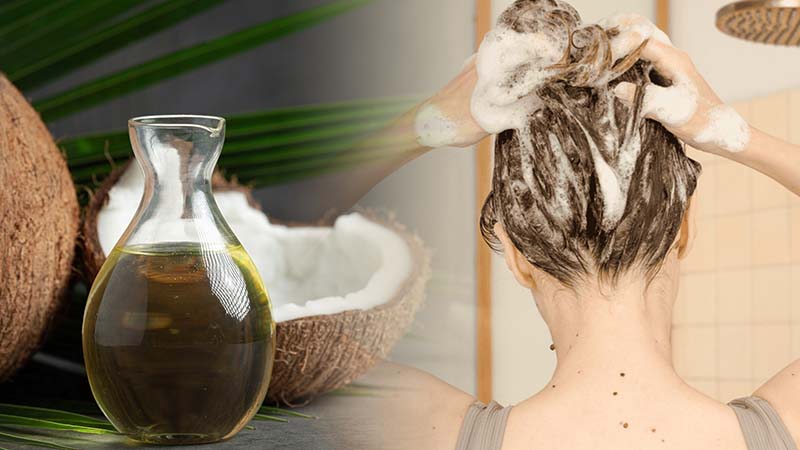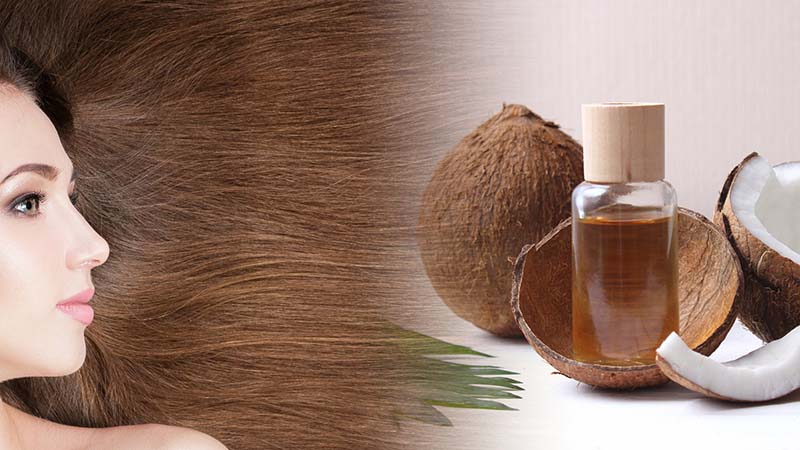Beauty Blog
Is Coconut Oil Good for Curly Hair? Quick Benefits and Tips
Is coconut oil good for curly hair? Coconut oil is often praised as a wonder ingredient, and you might wonder about its suitability for your curls.
Rich in beneficial properties, coconut oil excels in various applications, from haircare to skincare, and even in cooking. Although it’s not advisable to use the same jar for both culinary and cosmetic purposes, recognizing the specific benefits of coconut oil for curly hair and scalp is essential. Additionally, assessing its compatibility with your hair type is crucial.
Is Coconut Oil Good for Curly Hair?
Coconut oil is indeed a stellar addition to your haircare routine, particularly for those with curly hair. You can apply it directly to dry hair or use hair products that are infused with coconut oil to harness its remarkable benefits.
Deep Moisturization
Curly hair often struggles with dryness, but coconut oil can deeply penetrate the hair follicles, providing moisture from within. This results in curls that are not only well-hydrated but also look silky and vibrant.
Frizz Fighting
Frizz is a common challenge for curly-haired individuals, particularly in humid conditions. Coconut oil acts as a natural frizz-fighter, smoothing the hair cuticle and keeping those flyaways in check, leaving your curls perfectly coiled and manageable.
Added Strength
Coconut oil is not just about improving the appearance of your curls—it also strengthens the hair. This added resilience reduces the risk of damage, ensuring your curls remain healthy, shiny, and full of life.
Curl Definition
For those tired of the tedious task of styling and defining curls, coconut oil offers a simpler solution. It helps enhance and define natural curls, reducing the need for extensive styling products and time-consuming techniques.

Expert Tips for Using Coconut Oil in Hair Care
To maximize the benefits of coconut oil for your hair, follow these expert guidelines:
- Choose Raw Coconut Oil: Opt for raw, unrefined coconut oil, as it retains more of the natural vitamins and minerals that are essential for hair nourishment.
- Application: Smooth coconut oil onto your hair and use a comb to distribute it evenly through dry strands. This ensures that every hair benefits from the oil’s properties.
- Duration: Leave the coconut oil in your hair for at least 15 to 30 minutes. This allows ample time for the oil to penetrate deeply and hydrate your hair effectively.
- Washing Out: After the treatment, wash your hair thoroughly with a high-quality shampoo. You might need to shampoo twice to completely remove the oil. Follow up with your usual conditioning routine.
Note: For an intensive treatment, you can leave the coconut oil in your hair overnight. Just cover your hair with a shower cap or a towel to protect your pillowcase. This extended treatment is especially beneficial for extremely dry or damaged hair, as it allows more time for the oil to work its magic.

Key Benefits of Coconut Oil for Hair Health
While there is no concrete evidence that coconut oil can accelerate hair growth, its significant impact on hair and scalp health might give the appearance of faster growth.
Fights Fungal Infections
Healthy hair starts at the root, and maintaining a healthy scalp is crucial for optimal hair growth. Recent laboratory studies have shown that coconut oil is effective against certain fungal infections, which may contribute to a healthier scalp environment. This could potentially help in treating or preventing dandruff and other scalp-related fungal issues, though more research is required to fully understand these effects.
Calms Irritation
As a natural saturated fat, coconut oil’s high fat content helps soothe scalp irritation, reduce flaking, and alleviate itching. These fats not only calm the scalp but also help lock in moisture, ensuring that the hair remains hydrated.
Treats Split Ends
Research indicates that coconut oil can penetrate hair strands more effectively than mineral oil and other oils. This penetration helps prevent hair breakage and the formation of split ends.
Regular use of coconut oil might reduce the frequency of needed hair trims, making hair appear to grow longer and healthier. Furthermore, studies highlight coconut oil’s role in reducing protein loss in hair, which helps prevent the hair from becoming dry and brittle.

Protects from Heat Damage
Applying a small amount of coconut oil to wet hair before drying or using heat styling tools can provide a protective barrier against water and heat damage.
Hygral fatigue, which occurs from excessive hair swelling due to water absorption, often leads to hair damage and breakage. Coconut oil can mitigate this swelling, thus preserving hair strength and vitality over time.

Potential Side Effects of Coconut Oil on Hair
While coconut oil is celebrated for its numerous benefits for hair health, there are potential drawbacks to consider, particularly for certain hair types and individuals with allergies.
- Allergic Reactions: The most significant risk associated with coconut oil is the possibility of an allergic reaction, especially for individuals allergic to coconut. Symptoms can include allergic contact dermatitis, which often occurs with the use of haircare products containing coconut oil. It is crucial for those with known allergies to avoid coconut oil in their hair care regimen.
- Weighing Down Fine Hair: For those with fine hair, coconut oil might be too heavy, leading to hair that looks limp, flat, and greasy. It is important for individuals with this hair type to use coconut oil sparingly to avoid an overly oily appearance.
- Stiffness in Coarse Hair: While coconut oil is beneficial for moisturizing and conditioning, overuse on coarse hair can result in hair becoming stiff and difficult to manage. It is advisable to use coconut oil in moderation and ensure thorough washing to prevent any build-up.
- Clogged Pores: Some users might experience clogged pores on the scalp due to coconut oil, especially if applied near the scalp or used excessively. This can lead to scalp acne or discomfort, making it necessary to adjust the frequency and quantity of coconut oil application.
Note: To minimize these potential side effects, it’s recommended to start with a small amount of coconut oil and gradually adjust the usage based on how your hair responds. Also, conducting a patch test before applying coconut oil extensively can help identify any adverse reactions and prevent scalp or hair issues.
When to Avoid Overnight Coconut Oil Use for Hair?
Although leaving coconut oil on your hair overnight is beneficial for many, there are certain situations where it’s best to avoid this practice:
Naturally Oily Scalp: If you have an already oily scalp, leaving coconut oil on overnight might not be beneficial. Coconut oil is thick and viscous, forming a layer over the surface it is applied to. This can exacerbate oiliness and, due to its comedogenic properties, potentially block pores. The blocked pores can attract more dirt and dust, making the process counterproductive.
Excess Protein: Introducing excessive protein to your hair can result in increased frizziness and potential damage. If your hair already has a high protein content, adding more through coconut oil can be detrimental. It is advisable to consult with a hairstylist to determine your hair’s protein levels before incorporating overnight coconut oil treatments. This will help ensure that you are not inadvertently causing more harm than good.
Creative Ways to Incorporate Coconut Oil into Your Hair Routine
Coconut oil is one of the most versatile hair care oils available, offering multiple benefits whether used as a pre-shampoo treatment, conditioner, styling aid, or mask.
Here are five simple ways to revitalize your haircare routine with coconut oil:
- Prewash Protector: Applying coconut oil before shampooing can prevent your hair from absorbing too much water, reducing damage and dryness. Apply coconut oil about 15 to 30 minutes before washing your hair, focusing on the midsection and ends. This prewash treatment helps maintain hair strength and moisture.
- Conditioner: Coconut oil can strengthen the hair shaft and prevent breakage, making it a great alternative to standard conditioners. You can use it on its own or add a few drops to your usual conditioner to enhance its smoothing effect. This dual approach helps in maintaining smooth and resilient hair.
- Styling Aid: A small amount of coconut oil can effectively tame frizz. For best results, apply the oil to damp hair, which allows for easier absorption and styling. This method keeps your hair looking sleek and well-managed without feeling greasy.
- Hair Mask: For a deeply nourishing treatment, massage a teaspoon or two of coconut oil through your hair. Leave it on for a few hours or overnight if your hair is extra dry or damaged. This intensive treatment provides significant hydration and repair, leaving your hair soft and revitalized.
- Sun Protection: Coconut oil may offer some protection against sun damage caused by ultraviolet light exposure. While more research is needed to confirm this benefit, applying a light layer of coconut oil can help shield your hair from potential UV damage while keeping it moisturized and healthy.
Ideal Frequency for Applying Coconut Oil to Your Hair
Research suggests that applying coconut oil to your hair once or twice a week can effectively limit damage, such as hair breakage. For optimal results, some haircare experts recommend using coconut oil a few times per week, depending on your hair type.
- Normal to Thick Hair: Applying coconut oil two to three times a week can provide the necessary moisture and protection without causing buildup.
- Fine Hair: For finer hair, using coconut oil once a week or even less may be more beneficial to avoid weighing down the hair and making it appear greasy.
- Dry or Damaged Hair: If your hair is particularly dry or damaged, using coconut oil up to three times a week can help restore moisture and repair the hair shaft.
Note: Always start with a small amount to see how your hair reacts and adjust the frequency accordingly. It’s essential to find the right balance that works best for your specific hair needs to avoid any potential drawbacks.
Can Coconut Oil Be Used as a Conditioner?
Absolutely, coconut oil is an excellent choice for hair conditioning. Its unique properties allow it to penetrate deeply into the hair shaft, delivering intense moisture and nourishment.
To utilize coconut oil as a conditioner, start by applying it at the roots and gently work it through to the ends of your hair. For a quick boost of hydration, leave it on for about 30 minutes. For a more profound treatment, consider leaving it overnight with your hair wrapped in a shower cap or towel to keep the oil contained. When you’re ready, wash it out with your regular shampoo and conditioner.
This natural remedy is exceptional for tackling dryness, reducing frizz, and repairing damage, ultimately leaving your hair silky, hydrated, and easier to manage. Nonetheless, coconut oil might not be compatible with every hair type. It’s wise to conduct a patch test first and tailor its use according to your hair’s response.
Discover If Coconut Oil Is Safe for Baby Hair
Coconut oil can be safely used on baby hair and is particularly effective as a treatment for cradle cap. Cradle cap is a common condition that causes crusty, oily, or scaly patches on a baby’s scalp. Here’s how to use coconut oil to alleviate these symptoms:
- Application: Gently apply coconut oil to your baby’s scalp, ensuring you cover the affected areas.
- Duration: Leave the coconut oil on for about 20 minutes to allow it to soften the crusty patches.
- Rinse: After the 20 minutes, gently rinse the oil off your baby’s scalp.
- Combing: Use a soft brush to carefully comb through their hair, helping to remove any loose flakes.
This method can help soothe your baby’s scalp and reduce the symptoms of cradle cap. However, always ensure to use pure, unrefined coconut oil to avoid any potential irritation from added chemicals or fragrances.
Conclusion
In conclusion, is coconut oil good for curly hair? Absolutely. Its deep conditioning properties combat dryness, seal in moisture, and reduce frizz, making it a superb natural choice for enhancing curly hair health. By promoting a healthier scalp and minimizing dandruff, coconut oil helps achieve softer, shinier, and more resilient curls. Results can vary, but incorporating coconut oil into your hair care routine is likely to improve both your curls and your confidence.
For more insightful blogs on hair care and other related topics, be sure to check out Ballyhoo Media.
